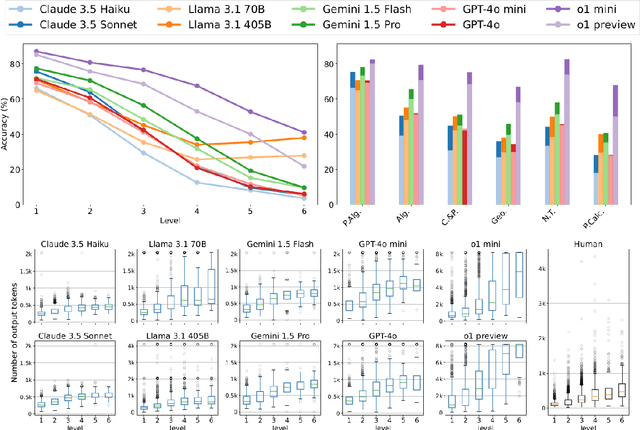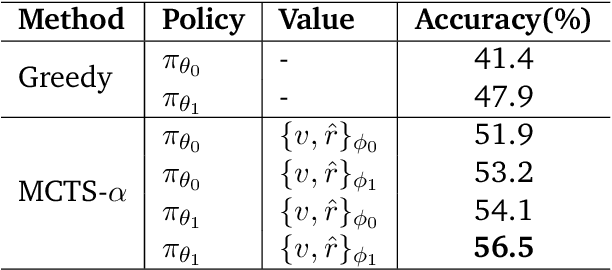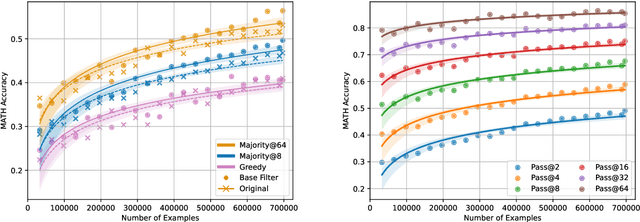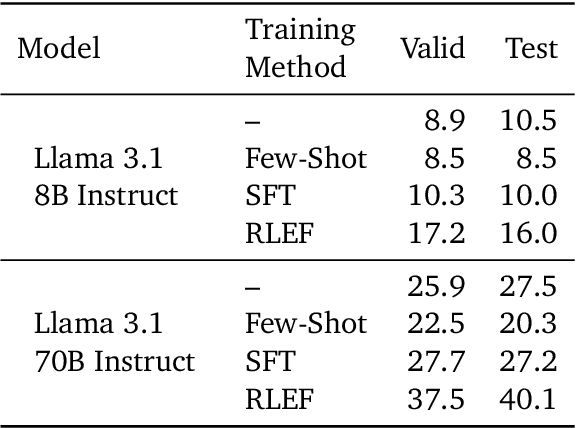Nathan Lile
Just Enough Thinking: Efficient Reasoning with Adaptive Length Penalties Reinforcement Learning
Jun 06, 2025Abstract:Large reasoning models (LRMs) achieve higher performance on challenging reasoning tasks by generating more tokens at inference time, but this verbosity often wastes computation on easy problems. Existing solutions, including supervised finetuning on shorter traces, user-controlled budgets, or RL with uniform penalties, either require data curation, manual configuration, or treat all problems alike regardless of difficulty. We introduce Adaptive Length Penalty (ALP), a reinforcement learning objective tailoring generation length to per-prompt solve rate. During training, ALP monitors each prompt's online solve rate through multiple rollouts and adds a differentiable penalty whose magnitude scales inversely with that rate, so confident (easy) prompts incur a high cost for extra tokens while hard prompts remain unhindered. Posttraining DeepScaleR-1.5B with ALP cuts average token usage by 50\% without significantly dropping performance. Relative to fixed-budget and uniform penalty baselines, ALP redistributes its reduced budget more intelligently by cutting compute on easy prompts and reallocating saved tokens to difficult ones, delivering higher accuracy on the hardest problems with higher cost.
Cognitive Behaviors that Enable Self-Improving Reasoners, or, Four Habits of Highly Effective STaRs
Mar 03, 2025



Abstract:Test-time inference has emerged as a powerful paradigm for enabling language models to ``think'' longer and more carefully about complex challenges, much like skilled human experts. While reinforcement learning (RL) can drive self-improvement in language models on verifiable tasks, some models exhibit substantial gains while others quickly plateau. For instance, we find that Qwen-2.5-3B far exceeds Llama-3.2-3B under identical RL training for the game of Countdown. This discrepancy raises a critical question: what intrinsic properties enable effective self-improvement? We introduce a framework to investigate this question by analyzing four key cognitive behaviors -- verification, backtracking, subgoal setting, and backward chaining -- that both expert human problem solvers and successful language models employ. Our study reveals that Qwen naturally exhibits these reasoning behaviors, whereas Llama initially lacks them. In systematic experimentation with controlled behavioral datasets, we find that priming Llama with examples containing these reasoning behaviors enables substantial improvements during RL, matching or exceeding Qwen's performance. Importantly, the presence of reasoning behaviors, rather than correctness of answers, proves to be the critical factor -- models primed with incorrect solutions containing proper reasoning patterns achieve comparable performance to those trained on correct solutions. Finally, leveraging continued pretraining with OpenWebMath data, filtered to amplify reasoning behaviors, enables the Llama model to match Qwen's self-improvement trajectory. Our findings establish a fundamental relationship between initial reasoning behaviors and the capacity for improvement, explaining why some language models effectively utilize additional computation while others plateau.
Big-Math: A Large-Scale, High-Quality Math Dataset for Reinforcement Learning in Language Models
Feb 24, 2025Abstract:Increasing interest in reasoning models has led math to become a prominent testing ground for algorithmic and methodological improvements. However, existing open math datasets either contain a small collection of high-quality, human-written problems or a large corpus of machine-generated problems of uncertain quality, forcing researchers to choose between quality and quantity. In this work, we present Big-Math, a dataset of over 250,000 high-quality math questions with verifiable answers, purposefully made for reinforcement learning (RL). To create Big-Math, we rigorously filter, clean, and curate openly available datasets, extracting questions that satisfy our three desiderata: (1) problems with uniquely verifiable solutions, (2) problems that are open-ended, (3) and problems with a closed-form solution. To ensure the quality of Big-Math, we manually verify each step in our filtering process. Based on the findings from our filtering process, we introduce 47,000 new questions with verified answers, Big-Math-Reformulated: closed-ended questions (i.e. multiple choice questions) that have been reformulated as open-ended questions through a systematic reformulation algorithm. Compared to the most commonly used existing open-source datasets for math reasoning, GSM8k and MATH, Big-Math is an order of magnitude larger, while our rigorous filtering ensures that we maintain the questions most suitable for RL. We also provide a rigorous analysis of the dataset, finding that Big-Math contains a high degree of diversity across problem domains, and incorporates a wide range of problem difficulties, enabling a wide range of downstream uses for models of varying capabilities and training requirements. By bridging the gap between data quality and quantity, Big-Math establish a robust foundation for advancing reasoning in LLMs.
Towards System 2 Reasoning in LLMs: Learning How to Think With Meta Chain-of-Thought
Jan 08, 2025



Abstract:We propose a novel framework, Meta Chain-of-Thought (Meta-CoT), which extends traditional Chain-of-Thought (CoT) by explicitly modeling the underlying reasoning required to arrive at a particular CoT. We present empirical evidence from state-of-the-art models exhibiting behaviors consistent with in-context search, and explore methods for producing Meta-CoT via process supervision, synthetic data generation, and search algorithms. Finally, we outline a concrete pipeline for training a model to produce Meta-CoTs, incorporating instruction tuning with linearized search traces and reinforcement learning post-training. Finally, we discuss open research questions, including scaling laws, verifier roles, and the potential for discovering novel reasoning algorithms. This work provides a theoretical and practical roadmap to enable Meta-CoT in LLMs, paving the way for more powerful and human-like reasoning in artificial intelligence.
PERSONA: A Reproducible Testbed for Pluralistic Alignment
Jul 24, 2024Abstract:The rapid advancement of language models (LMs) necessitates robust alignment with diverse user values. However, current preference optimization approaches often fail to capture the plurality of user opinions, instead reinforcing majority viewpoints and marginalizing minority perspectives. We introduce PERSONA, a reproducible test bed designed to evaluate and improve pluralistic alignment of LMs. We procedurally generate diverse user profiles from US census data, resulting in 1,586 synthetic personas with varied demographic and idiosyncratic attributes. We then generate a large-scale evaluation dataset containing 3,868 prompts and 317,200 feedback pairs obtained from our synthetic personas. Leveraging this dataset, we systematically evaluate LM capabilities in role-playing diverse users, verified through human judges, and the establishment of both a benchmark, PERSONA Bench, for pluralistic alignment approaches as well as an extensive dataset to create new and future benchmarks. The full dataset and benchmarks are available here: https://www.synthlabs.ai/research/persona.
Suppressing Pink Elephants with Direct Principle Feedback
Feb 13, 2024Abstract:Existing methods for controlling language models, such as RLHF and Constitutional AI, involve determining which LLM behaviors are desirable and training them into a language model. However, in many cases, it is desirable for LLMs to be controllable at inference time, so that they can be used in multiple contexts with diverse needs. We illustrate this with the Pink Elephant Problem: instructing an LLM to avoid discussing a certain entity (a ``Pink Elephant''), and instead discuss a preferred entity (``Grey Elephant''). We apply a novel simplification of Constitutional AI, Direct Principle Feedback, which skips the ranking of responses and uses DPO directly on critiques and revisions. Our results show that after DPF fine-tuning on our synthetic Pink Elephants dataset, our 13B fine-tuned LLaMA 2 model significantly outperforms Llama-2-13B-Chat and a prompted baseline, and performs as well as GPT-4 in on our curated test set assessing the Pink Elephant Problem.
 Add to Chrome
Add to Chrome Add to Firefox
Add to Firefox Add to Edge
Add to Edge